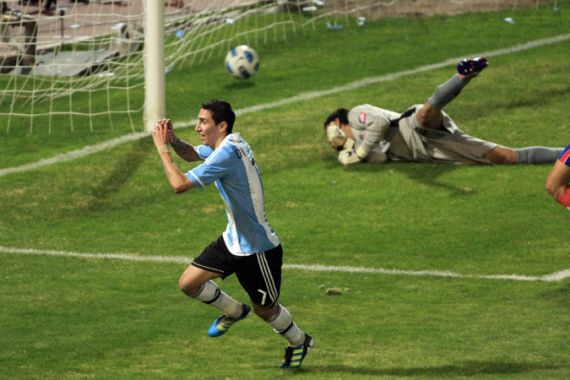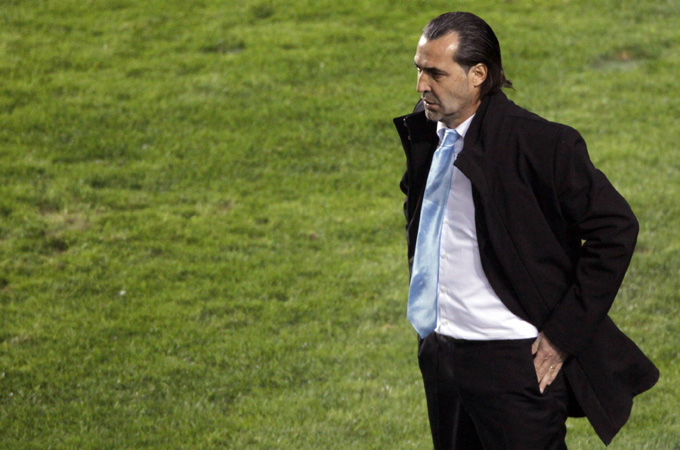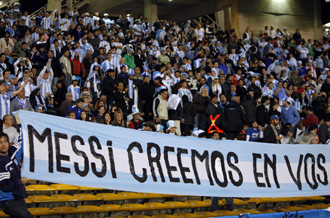The heat is on Argentina
Argentina scraped through to the Copa America quarter-finals but fans will be baying for blood if they lose to Uruguay.

 |
| Sergio Batista found himself under intense scrutiny following draws with Bolivia and Colombia [EPA] |
Like many words in Argentine slang, quilombo has its origins in something sinister which has since evolved into an habitual word used to describe a messy situation, like the country’s attempts to qualify for the quarter-finals of the 2011 Copa America.
Watching Sergio Batista’s team fumble their way to two opening draws against Bolivia and Colombia nestled among a group of cynical Porteños (natives of Buenos Aires) was an intimate lesson in Lunfardo, the slang which evolved from two centuries of nefarious criminal underground networks in the Argentine capital from the 19th and 20th centuries.
Keep reading
list of 4 itemsBayer Leverkusen win first Bundesliga title, ending Bayern Munich’s reign
Arsenal shocked by late Aston Villa double as title tilts towards Man City
Liverpool’s Premier League title hopes hit by Palace win at Anfield
Almost every other word was an untranslatable curse, accompanied by ferocious hand gestures, the most incendiary reserved for Batista whenever his quizzical face appeared from the touchlines.
How could Argentina’s manager, blessed with the best player on the planet, make such a quilombo of the group stages in a tournament on home soil?
The situation was temporarily ameliorated after securing their place in the quarter-finals courtesy of a 3-0 victory over Costa Rica on Monday, but the scenario wasn’t quite how most observers envisaged – Argentina qualified in second place in Group A behind Colombia, setting up a precarious last-eight encounter against Uruguay in Sante Fe on Saturday.
Their neighbours from across the Rio Plata have only beaten them once since 1989, a record which stretches back to 13 internationals.
But like the country’s soaring inflation rate, the cynicism of most Argentine football fans also shows no signs of abating.
Centre piece
At the centre of the quilombo is Lionel Messi, the most gifted individual kicking a football on the planet, and his team of cracks who cannot find the right equation for the sum of their individual parts.
Batista’s attempts to mimic Barcelona’s tactics and build a team around the waspish number 10 failed spectacularly against Bolivia and Colombia, a 4-3-3 with Messi at the head completely lost in the abyss alongside Carlos Tevez and Ezequiel Lavezzi.
Only a spectacular volley from substitute Sergio Aguero spared the hosts’ blushes in La Plata against Bolivia, yet Batista stubbornly adopted the same tactics against Colombia five days later, much to the chagrin of the disgruntled press and public.
 |
| Argentine supporters believe in Messi but they are less certain about their national side [EPA] |
“To try and imitate Barcelona is a high-risk bet,” said Alfio Basile, who guided Argentina to two Copa America victories in 1991 and 1993.
“They recover the ball when they lose it and for this reason they always have it. It’s impossible to play like them.
“Messi is missing company. If he doesn’t get the ball, it drives him crazy and there goes the game. There is no-one he can play off.”
A third attempt at the same tactics would have been tantamount to football suicide so, with little option, Bastita removed Inter Milan’s Estaban Cambiasso, Napoli’s Lavezzi, Valencia’s Ever Banega and the homesick Carlos Tevez in favour of Madrid-based quartet Fernando Gago, Gonzalo Higuain, Angel Di Maria and Kun Aguero for the must-win encounter against Costa Rica.
Three of the four played alongside Messi in Argentina’s gold medal-winning team from the 2008 Olympics, as well as goalkeeper Sergio Romero, right-back Pablo Zabaleta and midfielder Javier Mascherano.
The results were revelatory.
Playing his favourite role from deep, behind Aguero, Di Maria and lone frontman Higuain, Messi enthralled the crowd at Cordoba’s Mario Kempes Stadium, where one set of fans unravelled a banner which simply read “Messi we believe in you”, with two delightful assists for Aguero and Di Maria.
Playful side
Batista would be churlish to tinker with his 4-2-3-1 formation against Uruguay at the Brigadier General Estanislao Lopez Stadium in Sante Fe, a sentiment echoed by the sceptical press still not entirely convinced by one impressive performance in Cordoba.
But the media also have a sense of humour too – a photo of a distressed Neymar crunched by two defenders was accompanied by the headline “Also suffering” in Sunday’s La Nacion following Brazil’s 2-2 draw with Paraguay, their second draw of the tournament after a deflating 0-0 opening display against Venezuela. A 4-2 victory over Ecuador ensured Brazil went through to the quarter-finals but Mano Menezes’s team have failed to live up to their reputation.
As well as revelling in the schadenfreude of their celebrated neighbour’s plight, Argentines have been tickled by a Youtube clip of a dumbfounded River Plate fan screaming obscenities at his television screen watching his team relegated on the final day of the season last month.
Tano Pasman was blissfully unaware his rant, loaded with vengeful and explicit Lunfardo, was being recorded and has since become a viral sensation around the country and the world.
Anything less than a victory on Saturday and Pasman’s scene would be replicated up and down the country.
That’s one quilombo Batista does not want on his hands.
Pranav Soneji is an experienced journalist who has worked for the BBC and is a joint executive at LiveWire Sport.
Follow Pranav Soneji on Twitter: @pranav_soneji